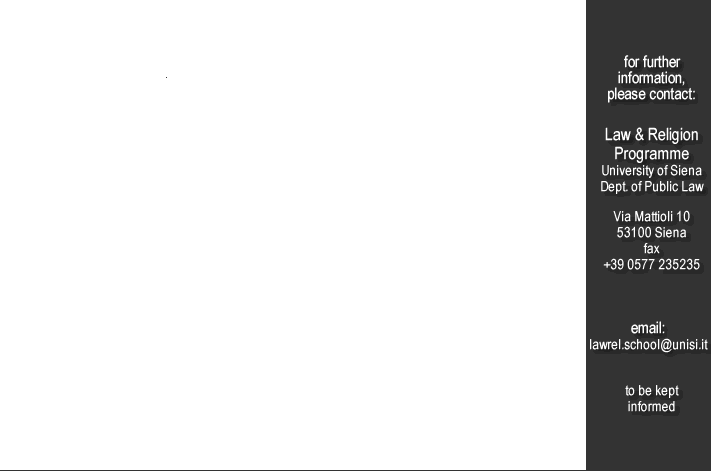WHO CAN APPLY |
The Summer School aims to attract participants of postgraduate
level, doctoral students, young researchers but also persons with positions
in the private or public sector that involve law and religion issues and in
particular:
- Young diplomats, in order to develop knowledge of a topic that is a central
issue for the aims and activities of international institutions, starting
from UN, and with the aim of obtaining further skills in such a strategic
area;
- Officials of military bodies, in order to build a platform of knowledge
and understanding as military units are used ever more frequently in peace-keeping
operations and in international campaigns involving religion as a crucial
socio-political factor;
- Employees of public institutions (such as state-government, regions, provinces
or municipalities) to develop the ability to cope with immigration, foreign
manpower, and multicultural integration;
- Teachers, at all levels, to develop knowledge about law and religion for
pedagogical purposes, and personnel of local education offices who are in
charge of the teachers' professional training;
- People working in the world of media and communication who develop the relationship
between the media and public opinion, to enable them to raise awareness of
and enhance the debate on all the issues linked to law, politics and religion;
- People in charge of marketing and fund-raising who work in non-profit agencies
or in public institutions where communication strategy and income generation
must adjust to the humanitarian aims of their organizations;
- Scholars who want to deepen their theoretical, historical and analytical
framework of law and religion with a high level of specialization and an interdisciplinary
approach.;
- People working in voluntary organizations who wish to acquire a specialist
knowledge of law and religion to offer to their associates and to use in fact-finding
missions and other field work abroad.
A legal background is not required.
All teaching will be in English and applicants must therefore feel confident
that they can follow a lecture or seminar and take part in discussions in
English.
A certificate of attendance will be given to those who attend lectures and
seminars regularly. No other diploma or certificate will be awarded.
Number of participants is fixed to a maximum of 30.


